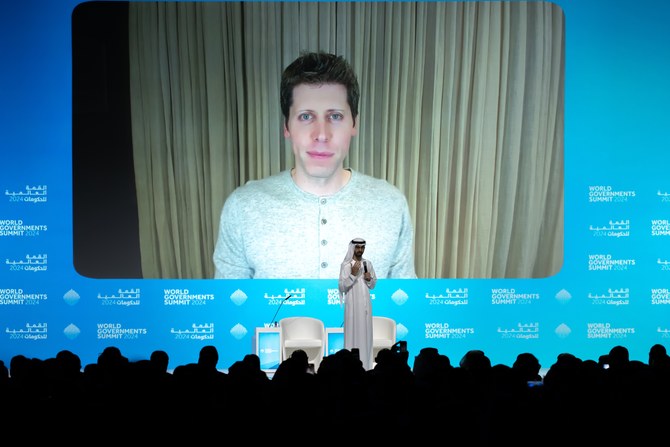DUBAI: Artificial intelligence technology is currently in television’s equivalent of “black and white” but the coming decade “will be remarkable,” said Sam Altman, CEO of OpenAI, on Tuesday.
Speaking via video on the second day of the World Governments Summit underway in Dubai, Altman said the “bright future” promised by AI would transform education and medicine, and result in the development of new sciences.
He urged governments to adopt AI technology, which he said would improve the lives of citizens and modernize workplaces. There should also be efforts made to develop global standards for studying the technology and establishing safety regulations.
“What we have now would have been unimaginable in the era of the first primitive cellphones and that’s what we need to push for.”
He added: “In a few more years, (AI technologies) will be much better than it is now and, in a decade, it should be remarkable.”
OpenAI is the developer of ChatGPT, which Altman called “one of the most transformative technologies in education we have had in recent times.”
He said the core of AI was making intelligence broadly available, accessible, and inexpensive, noting that humanity still fails to realize “how limited we are.”
“Imagine a world where everyone gets a personal tutor, a great personalized medical advice, and how we can use these tools to discover new sciences and build healthy environments,” said Altman.
Asked what he would do if he was a minister of AI, Altman said he would create a “regulatory box” that would enable people to experience the new technologies before governments establish regulations.
“It’s hard to get regulatory ideas in a vacuum, so if there was a contained way to give people the future and let them experiment with it and see what went wrong or right, then put regulations around, I’d do that.”
Altman said people today were “unbelievably lucky” to be living “in the best time of human history.”
“You will use these tools that will enable you to do things people in previous generations couldn’t have imagined,” he said.
Running until Feb. 14, this year’s WGS brings together more than 25 heads of state, more than 85 international and regional organisations and global institutions, 140 governments, and distinguished global thought leaders and experts.
Over 200 prominent speakers are addressing global future trends during more than 110 dialogues and sessions. WGS 2024 also hosts more than 4000 attendees, as well as more than 23 ministerial meetings and executive sessions attended by more than 300 ministers.

























